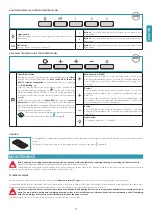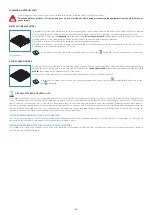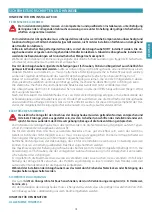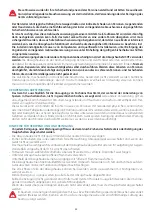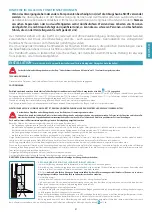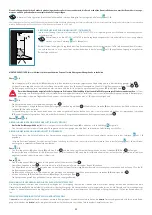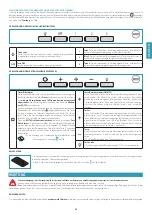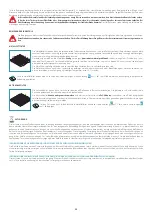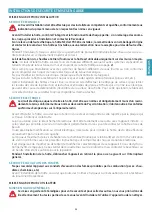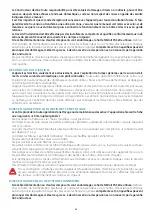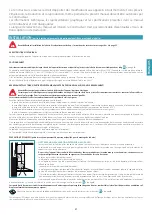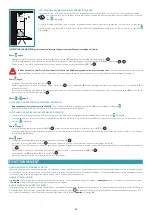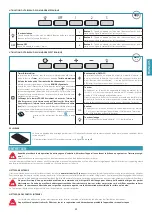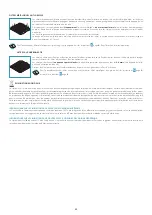
ENGLISH
15
INSTALLATION
(only intended for personnel qualified to install the hood)
Before installing the hood, carefully read Chap. "Safety instructions and warnings" on page 13.
TECHNICAL FEATURES
The technical specifications are reported on the identification plate located inside the hood.
POSITIONING
The minimum distance between the highest part of the equipment for cooking and the lowest part of the hood is indicated in Fig.
A
on page
4.
Generally, when the hood is placed on gas cookers, this distance must be at least 65 cm (25.6"). However, according to an interpretation of standard EN60335-2-31
dated 11-07-2002 of TC61 (sub-clause 7.12.1 meeting 15 agenda item 10.11), the minimum distance between the cooker and lower part of the hood can be reduced
to the reported quota.
Should the instructions for the gas cooker specify a greater distance, take this into consideration.
Do not install the hood outdoors and do not expose it to atmospheric agents (rain, wind, etc.).
ELECTRICAL CONNECTION (ONLY INTENDED FOR PERSONNEL QUALIFIED TO INSTALL THE HOOD)
Disconnect the equipment from electrical mains power supply before carrying out any operations on the hood.
Make sure that the wires inside the hood are not disconnected or cut. Should this occur, contact your nearest Servicing Department. Refer to
qualified personnel for electrical connections.
Connection must be carried out in compliance with the provisions of law in force.
Before connecting the equipment to the electrical mains power supply, check that:
•
voltage supply corresponds with what is reported on the identification plate located inside the hood;
•
the electrical system is compliant and can withstand the load of the equipment (refer to the technical specifications on the identification plate located inside the
hood);
•
once connected, the plug and cable do not come into contact with hot parts having temperatures that exceed 70°C
•
the power supply system is effectively and properly connected to earth in compliance with regulations in force.
•
the socket outlet to connect the installed equipment is within reach.
Some types of equipment can be equipped with a cable without a plug; in this case, the type of plug to use is a "standardised" one, keeping in mind that the yel-
low-green wire must be used for earthing, the blue wire must be used for neutral, and the brown wire must be used for the phase..
The power supply cable must be assembled with a plug suitable for the load and connected to an adequate safety plug.
If the fixed equipment is not provided with a power supply cable and plug, or any other device that ensures disconnection from the electrical mains, with an opening
gap of the contacts that enables total disconnection in overvoltage category III conditions, said disconnection devices must be provided in the mains power supply
in compliance with installation regulations.
The yellow/green earth cable must not be cut off by the switch.
The Manufacturer declines all responsibility for failure to comply with the safety regulations.
FUMES DISCHARGE (only intended for personnel qualified to assemble the hood)
EXTERNAL EXHAUST HOOD VERSION (SUCTION)
In this version, the kitchen fumes and vapours are conveyed outside through an exhaust pipe.
The air outlet fitting that extends from the upper part of the hood must be connected with the pipe that conducts the fumes and
vapours to an external output.
Do not connect the equipment to discharge pipes of fumes produced from combustion (for example boilers, fireplaces,
etc) and you are to comply with the regulations in force regarding external air discharge.
The fumes outlet pipe must have:
- a diameter not less than that of the hood fitting;
- a slight slope downwards (drop) in the horizontal sections to prevent any formation of condensation from flowing back to the
hood;
- the minimum required number of bends;
- minimum required length (long pipes with various bends can reduce suction performance of the hood and trigger vibrations
of the check valve).
If the fumes outlet pipe passes through cold environments such as attics, etc., it is possible that water condensation forms due to
sudden changes in temperature. In this case, you are required to insulate the pipes.
The hood supplied with an 800 m3/h motor is equipped with a check valve whose function is to prevent external air exchange
when the hood is not operating: refer to the instructions
C
on page
4
for assembly.
When the kitchen hood is used simultaneously with other appliances that use gas or other fuels, the room must have sufficient ventilation, in accordance
with regulations in force.
The active carbon filters in this version are to be removed. Refer to the instructions
H
on page
6
for removal.
Deviation for Germany: when the kitchen hood is used at the same time as appliances that are powered by energy other than electricity, the negative pressure in the room must
not exceed 4 Pa (4 x 10-5 bar).
Summary of Contents for Mizar 90
Page 5: ...5 5 L H V5 x2 3 L L H 4 6 mm 6 6 V4 x2 1 2 E F G H V3 x4 1 2...
Page 6: ...6 3 1 2 G 1 2 2 12V 1 2 3 H I...
Page 37: ...37 2 10...
Page 38: ...38 Il l 8 1 5...
Page 39: ...39 37 A 4 65 25 6 EN60335 2 31 11 07 2002 TC61 7 12 1 15 10 11 70 C III...
Page 42: ...42 15 Magic Steel 1 55 C G 6 3 4 G 6 H 6 E C WEEE...
Page 79: ...79 NOTE NOTES...

















